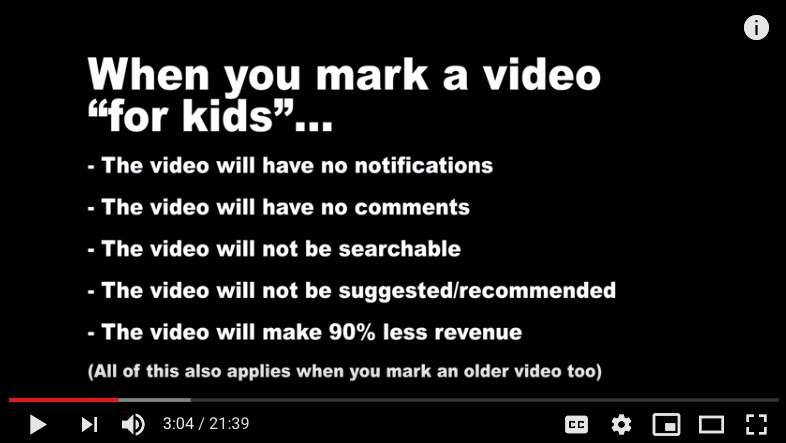In September, the Federal Trade Commission (FTC) wrist-slapped Google for flagrantly, illegally sucking up kids’ data so it could target them with ads.
On Monday, as part of its agreement with the FTC and the New York attorney general over violating the federal Children’s Online Privacy Protection Act (COPPA), YouTube said it was beginning to apply its changes.
The big one: rather than trying to verify that users are over the age of 13, it’s just going to treat all content aimed at kids as if it is watched by kids (which it well may be, particularly when it comes to videos about, say, gaming, animation or toys), regardless of age of the viewer, and it’s going to COPPA-ify that content.
That means that if you’re making content that’s deemed to be aimed at kids, YouTube’s going to treat anybody who watches it as if they’re under the age of 13, regardless of how old a user actually is. As per federal COPPA guidelines, that means that YouTube will limit data collection and use and, hence, the serving up of personalized ads on such videos.
It sounds like a reasonable enough proposition, unless you’re one of the many content creators who’ll suffer the consequences of having their videos shunted to the cobwebby basement that is YouTube’s category of “for kids” – a place where, creators say, content crawls off to die from acute lack of revenue.
One content creator, Chadtronic, believes that flagging a video as “made for kids” will mean it makes significantly less money and will be far harder to find. He didn’t provide a source for his claims, but as Ars Technica reports, they’re being spread by other creators.

(Screenshot is from Chadtronic’s video linked above.)
Actually, his “90% less revenue” claim is the only one that’s questionable. As for the other claims, YouTube itself asserted them in its post on Monday: as YouTube said on its official blog, limiting data collection and use comes with a chokehold on product features such as the ability to comment, live chat, notifications, stories, save to playlist, and more.
So what happens if the creators simply eschew the “for kids” label? They could get their pants sued off by the FTC, that’s what.
Andrew Smith, Director of the FTC’s Bureau of Consumer Protection:
We […] have strong penalties in future cases against content creators and channel owners …particularly when we would have a situation where the channel owner was specifically asked ‘are you child-directed?,’ and the channel owner said ‘No.’
During a press conference to announce the $170 million fine in September, FTC Chairman Joseph Simons got explicit about the FTC’s willingness to sue content creators:
When we talk about aggressiveness, we are typically talking about civil penalties. Not only can we sue Google and YouTube for compliance with COPPA, but also individual channel owners and content creators.
No wonder content creators are panicking: COPPA fines can run up to a blistering $42,530 per violation. Mind you, the creators who could be personally subject to such fines neither collect, receive, nor have access to children’s user data – but still, they could be on the hook for violating the law if they don’t flag their videos as “made for kids.”
The FTC plainly states – in bold and italic so that you can hear it e-shouting – that…
COPPA applies [to content creators] in the same way it would if the channel owner had its own website or app.
Chairman Simons compared creators who don’t comply with COPPA to “fish in a barrel” – with the FTC holding the gun – at 15:10 during the press conference announcing the fine.
Unfortunately, when it comes to determining what content is made for kids, it’s kind of like the definition of porn – there’s a lot of “we know if when we see it”. But the FTC does provide factors it will consider in determining whether content is aimed at kids, saying that content “isn’t considered ‘directed to children’ just because some children may see it.”
The factors it will consider:
- the subject matter
- visual content
- the use of animated characters or child-oriented activities and incentives
- the kind of music or other audio content
- the age of models
- the presence of child celebrities or celebrities who appeal to children
- language or other characteristics of the site
- whether advertising that promotes or appears on the site is directed to children
- competent and reliable empirical evidence about the age of the audience.

Jan Doggen
“we know *IT* when we see it”
epic_null
I feel like they’ve gone and done it backwards. Youtube should treat any logged out users as kids regardless of what they watch, rather than treat viewers of certain videos as kids. I **know** they ask for birthday when people make accounts, so that would limit data collection to those who claim to be adults.
Natanael Vicecity
it affects 95% of the anime on youtube, the video hentai, there are videos on youtube not for children but they watch sex movies on youtube
Cole Hitch
Ah yes all animation is aimed toward kids I know when I saw Hazbin Hotel, and AH Animated I said “kids will love this!”.
Chris Beier
It also does not allow to save a video “for kids” in your playlist, to watch it later.
So “kids” are forced to watch all the content right when they stumble across it, instead of learning moderation and pacing themselves. This law is ****.
Bryan
@Chris
Yeah, that bit struck me as odd. I expect there’s rationale behind it, but it seems less constructive than the other limitations–and with clear disadvantages. As a parent, creating a watchlist sounds like a handy idea, even beyond using YouTube as interim babysitter:
Hey kid, finish your apple juice while I shower. Watch these three, four-minute videos, and I’ll be back before the last one ends, then we’ll walk the dog.
g f
Or save it as a favotite and get to it later.
Anonymous
also youtube kids is not an option because youtube have no control on what kids that are not theirs do. so youtube is blaming the content creators for this when their CONTENT CREATORS not BABYSITTERS
Anonymous
The problem is that there are so many channels that have animation, music or other forms of media that aren’t aimed at kids, and the FTC still haven’t made it fully clear what will happen to them, will they classify as a kids channel because of there large margin? Nobody really knows.
YouTube has spent years trying to make itself more kid friendly and force creators to become something they never used to have to be. And now this doesn’t want you being kid friendly or you won’t make nearly as much money, so all ‘edgy’ creators are now in a box. What’s the point of YouTube kids if they’re only going to make normal YouTube more kid friendly?
Anonymous
You know what’s really ****y? YouTube itself is policing these videos with a bot, and their bots dont exactly have a good reputation to begin with
Anonymous
they’re not focusing on youtube kids because youtube has no control on what kids do, parents do so its the parents that should be blamed.
Anonymous
The FTC isn’t even the issue. They know content that’s colorful and animated etc. can be enjoyed by all ages. Or mediums stigmatized as childish but also makes adult content. That fine is for content that’s trying to be harmful directly at kids. They don’t care about a channel that’s watched mostly by teens but keeps the cursing down anyway.
The problem is YouTube. They’re solution to the problem is terrible. As it hides away kids content from being searchable, which means only very adult content will be obviously available. And anything that’s for the general audience can get immediately labeled by the stupid bot in the system. Any kid content is condemned essentially. They’re punishing content creators when it isn’t their doing in any of this.
Plus, this didnt need to happen this way. YouTube only got in trouble for collecting data “on kids” when really they have data on devices that watch YouTube. They don’t know whose actually behind the screen. And to have an account means one is supposed to be 13 or older. It was an employee who said the wrong thing and got them stuck.
This would be solved so easily if it wasn’t the stupid “for kids or not for kids” labeling mess. Because YouTube needs a viewer rating system. There should be a general audience, and then age brackets. Content creators then label their videos. If a video is general, the creator could add a check mark to it so the video remains om YouTube, but also is sent to the YouTube Kids app (which by the way has stuff like cooking channels for parents when it should be a greater focus on literally what kids want).
It’s just a mess from someone shoving consequences onto someone else.
Shannon Martin
What if it’s a video of a MURDER TRIAL, and it’s based on a BABY OR CHILD who was the murder victim? Would YouTube bots mistakenly mark it as MADE FOR KIDS just because the words BABY AND CHILD was repeated over and over in the video?
Will
Why don’t YouTube PROMOTE “for kids” content “to kids”? Oh that’s right, because kids are not supposed to be on YouTube. So then surely they need to remove all the kids content from YouTube and publish it only on YouTube Kids. And that’s basically what they’re doing, in a slightly nicer way.
Want your content to be seen by kids? Put it on YouTube Kids. The free ride for content creators is over, they can no longer piggy-back on the profitable main YouTube site. Content creators are not the innocent party, they are making money from advertising just like YouTube is.
Dan
Will, there are creators that don’t monetize or put ads on their content, like how YouTube was early on before Google made it about making money. Channels without a substantial amount of subscribers or watch hours aren’t even eligible to monetize (by the channel creator). Those creators aren’t making any money at all, much less targeting ads, collecting data on users or violating COPPA. Why should they have to label a video as for kids and lose all the interactive features including comments?
If the FTC actually tried to fine a non-profit, non-data collecting creator for not labeling their video as for kids, that’d be nothing more than government infringement on freedom of speech. Would like to see them try to justify that in court. More likely YouTube got pressured into being excessively cautious, but still wanted to collect data and target ads on users not signed in, and didn’t want the burden of labeling videos so they pushed it onto creators. Maybe also for their new “right to monetize” so they can force targeted ads on creators’ videos against their will and keep all the money for themselves. Pathetic.